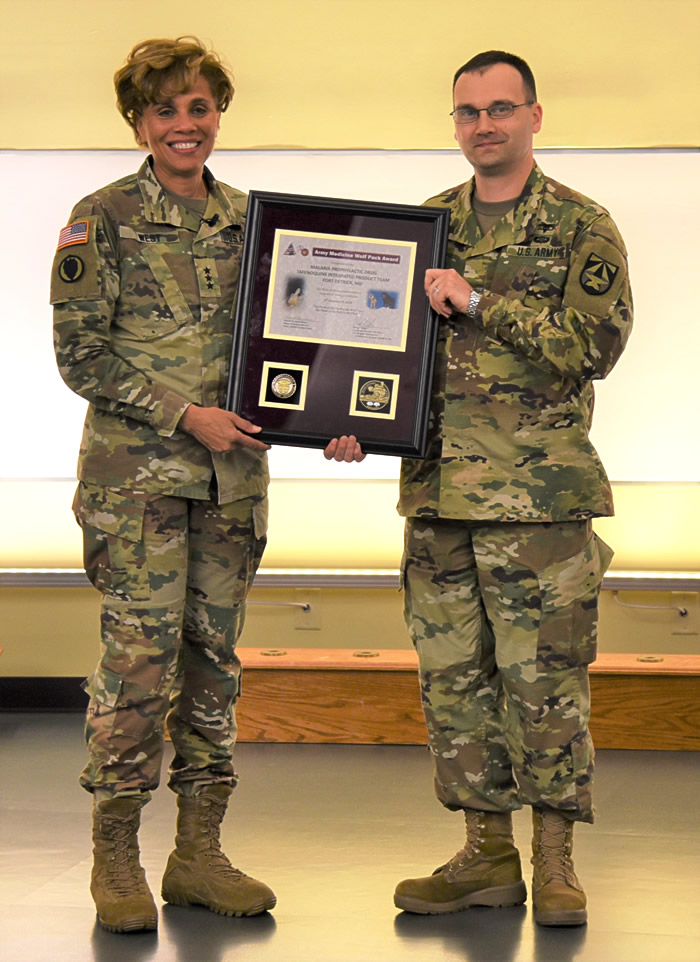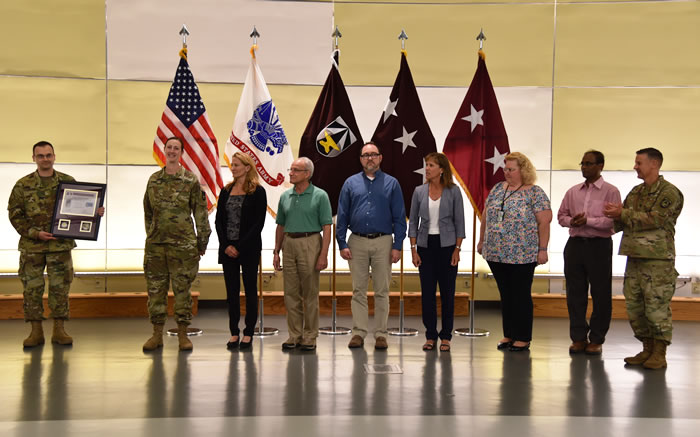USAMMDA Tafenoquine Team Wins Army Wolf Pack Award

The U.S. Army Medical Materiel Development Activity's Tafenoquine Integrated Product Team was recognized as the winner of the Army Medicine Wolf Pack Award for the first quarter fiscal year 2019 during a ceremony held at U.S. Army Medical Research and Development Command Headquarters, Fort Detrick, Maryland, June 25. The award was presented by Lt. Gen. Nadja Y. West, U.S. Army Surgeon General and commanding general, U.S. Army Medical Command.
The antimalarial drug Tafenoquine, or TQ, stands as the first U.S. Food and Drug Administration-approved prophylactic drug for malaria in more than 18 years. Transmitted through the bite of infected mosquitoes, malaria remains the top infectious disease threat to U.S. Service Members deployed overseas.
In her recent announcement of the new Wolf Pack awardee, West hailed the TQ IPT as a "dynamic team" that "epitomizes the highest standards of the Army and Army Medicine."
"The contributions of the [TQ] IPT provided critical support at a crucial time period during Tafenoquine's development," West stated. "The team's diligence to foster Tafenoquine through complex logistics systems, ensures that this critical drug makes it into the hands of the Warfighter. These collective efforts resulted in the DOD filling a critical capability gap by providing a highly safe and effective weekly drug to prevent malaria, thereby keeping troops on the line and protecting the Warfighter against this debilitating and often fatal disease."
Unlike current preventives used by the military, TQ is only required to be taken weekly (after a three-day loading dose) versus daily, and it is effective against all species and stages of the malaria parasite. The availability of this new drug will result in a measurable improvement in compliance and effectiveness in the prevention of malaria in U.S. forces deployed to malaria-endemic areas throughout the world.
The Wolf Pack Award was established by the U.S. Army Surgeon General and Army Medical Department Civilian Corps Chief to recognize exceptional teamwork by an integrated group of military and civilian team members focused on excellence in support of Army Medicine. Without question, the development of TQ has involved numerous groups over the past 40 years.
Consisting of 23 members, both military and civilian, the TQ IPT has worked closely with its industry partner since 2014 to obtain FDA approval of the drug, which was first discovered in 1978 within the Experimental Therapeutics branch at the Walter Reed Army Institute of Research, a subordinate laboratory of the U.S. Army Medical Research and Development Command. One decade later, TQ was transitioned to USAMMDA's Pharmaceutical Systems Project Management Office (now the Warfighter Protection and Acute Care PMO) where it has since been managed.
The FDA approval of TQ marks the culmination of a full-scale military medical development effort that includes various organizations. Among these are the Armed Forces Research Institute of Medical Science in Thailand, the U.S. Army Medical Research Unit – Kenya (now the U.S. Army Medical Research Directorate – Africa), the Naval Medical Research Unit-3 (Egypt/Ghana), the Army Malaria Institute of the Australian Department of Defence, WRAIR, USAMMDA, and its industry partner for production of the drug, 60° Pharmaceuticals, LLC.
Maj. Victor Zottig, WPAC PMO product manager for the TQ effort, has been involved with the program since November 2016. He is very familiar with the overall efficacy of this critical drug, and its importance in protecting both military and civilian populations against the effects of malaria.

"When I became the IPT chair and product manager for Tafenoquine in 2017, there was already a highly dedicated team of professionals with the necessary experience and commitment working toward the unified goal of obtaining FDA approval for this important drug," said Zottig.
"Within a short timeframe, the IPT completed an impressive amount of work in collaboration with our commercial partner to realize approval of TQ for the prevention of malaria by the FDA," he continued. "This is a tremendous achievement for everyone involved in this long, dedicated effort toward the global protection of Service Members and civilian personnel against malaria.
"We feel Tafenoquine offers improved comprehensive protective coverage against malaria over the current standard of care, due to its weekly dosing regimen and its activity against all of the lifecycle stages and species of malaria that infect humans, with no geographic limitations."
During a recent event held to recognize the FDA approval of TQ, Maj. Gen. Barbara R. Holcomb, commanding general of the USAMRDC and Fort Detrick, praised the efforts of those involved in the development of the drug, as she said, "Whether you worked on Tafenoquine for a day, a year, or your entire career, your contributions helped gain approval for the first FDA-approved malaria drug in over 18 years. This is not just a military achievement, but a significant achievement for world health."
"This new and powerful drug represents a significant milestone in the global fight against malaria, and it will have a tremendous impact on this devastating disease worldwide," said Holcomb.
Col. Ryan Bailey, who has served as the commander of USAMMDA for the past two years, recognized both the Tafenoquine team and USAMMDA's higher headquarters, for their work in the successful development and FDA approval of the antimalarial drug.
"The recent approval of Tafenoquine highlights the true value of the USAMRDC's lifecycle management mission," said Bailey. "Our collective work helped to bring a completely new product from early research to medical product development, clinical trial testing, collaboration with our commercial partner, and FDA approval – and now this important drug is moving towards production and ultimate fielding."
"It took the dedication of a great team to accomplish this, and that is truly the spirit of the Wolfpack Award," he added. "This drug certainly will make a positive difference in protecting our Soldiers against malaria."
As a subordinate command of the U.S. Army Medical Research and Development Command, USAMMDA maintains a mission to develop and deliver quality medical capabilities to protect, treat and sustain the health of our nation's Service Members throughout the world.













